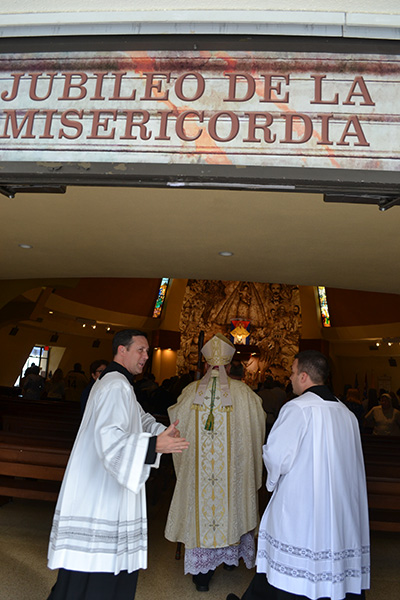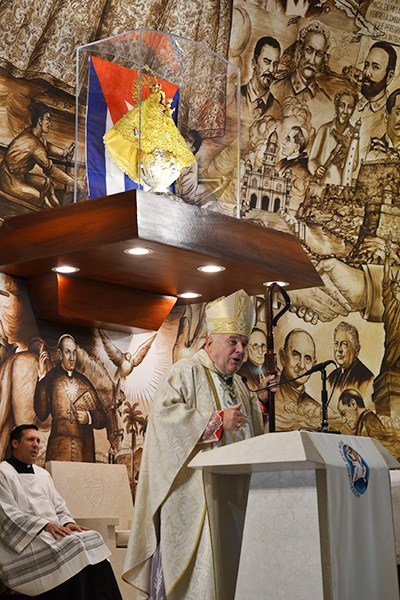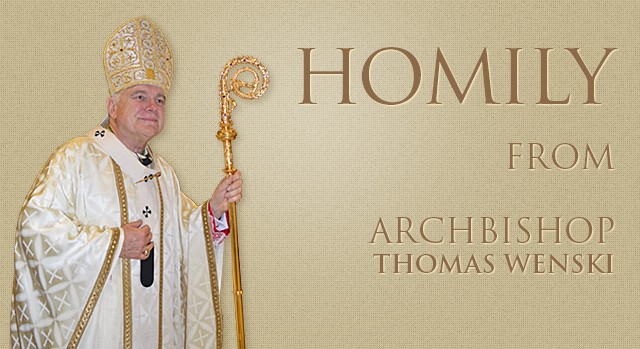By Archbishop Thomas Wenski - The Archdiocese of Miami
Homily by Archbishop Thomas Wenski at Mass with catechists for the Year of Mercy at Our Lady of Charity National Shrine (La Ermita). Friday, September 23, 2016.
Jesus asked his disciples: Who do people say that I am? After hearing their replies as to broad gamut of public opinion about his self, Jesus then asks them: Who do you say that I am. Peter, of course, answered: You are the Christ. Peter’s faith is the faith of the Church, Peter’s faith is, by the grace of God, our faith � and it is for the sake of this faith, of its being handed on to future generations that you have accepted to be catechists. Our Catholic community does not exist as an end in itself. The Church is fundamentally an evangelical movement: it exists to show God to the world; and because it exists to show God to the world, it exists for others. We exist � and our ministries exist (and among these ministries, that of being a catechist should take pride of place) � simply to spread Christ’s name and make it loved by the witness of our lives.

Photographer: MONICA LAUZURIQUE | FC
Archbishop Thomas Wenski enters the Shrine of Our Lady of Charity. At left is Father Richard Vigoa, his priest-secretary, and at right is Raul Panellas of the Office of Worship.

Photographer: MONICA LAUZURIQUE | FC
Archbishop Thomas Wenski preaches the homily at the Mass with catechetical leaders.
This is no easy task � we live in a culture that is much wounded, and this is reflected in the fragility of our families, many of which are broken. Here in America individualism is very strong but we want our children and all those we are entrusted to form in the faith to discover, in the light of that same faith, that they are called to live responsibly a specific vocation to friendship with Christ and in solidarity with other persons.
To talk about one’s “specific vocation to friendship with Christ” might sound like a lot of pious talk �but is this really about the “real world’. I hope you already know the answer to this question, otherwise you wouldn’t be here. Let me quote a master catechist, Pope Benedict. He says: “Anyone who excludes God from his horizons falsifies the notion of reality and�can only end up in blind alleys or with recipes for destruction.” And this describes pretty much the crises of modern civilization. The Pope adds, “Only those who recognize God know reality and are able to respond to it adequately and in a truly human manner.
Again, to return to Pope Benedict: In speaking of the priority of faith in Christ and life in him and that such a priority in no way represents a flight from reality, he asks: “ who knows God How can we know him? For the Christian, the reply� is simple: only God knows God, only his Son who is God from God, true God, knows him�. If we do not know God in and with Christ, all of reality is transformed into an indecipherable enigma; there is no way, and without a way, there is neither life nor truth. God is the foundational reality, not a God who is merely imagine and hypothetical, but God with a human face; he is God with us, the God who loves even to the Cross.”
Today, we celebrate the feast day of Saint Padre Pio � a man who captured the imagination of so many Catholics in the 20th century. In the aftermath of the horrors of World War I, he became a symbol of hope for common people � even while many more sophisticated people, both in and outside the Church regarded him with suspicion and even distain. He bore the stigmata of Christ, and lived a life of great penance dedicating himself to hearing confessions and the care of the sick. But, nobody is born a saint: faith is a gift of God given in Baptism but it is a gift that must be nurtured. And here Padre Pio’s parents played a key role. There were illiterate but very devote�they memorized passages of Scripture and would tell Bible stories to their children. When their boy wanted to join the Capuchins, the friars told the family that they would take him but first he needed to improve his education. Coming from a poor illiterate family, he was barely literate himself � and so his father immigrated briefly to the United States in order to raise money to educate the boy (who also needed the assistance of some private tutors.)
As I said already, we live in a deeply wounded culture: individualism, narcissism, materialism, consumerism � a whole bunch of “isms” - work against the faith. It is a hostile environment that makes it difficult to nurture the faith. Perhaps the simple faith of Padre Pio can inspired; but also the confident faith of his poor, illiterate parents should encourage us not to lose confidence ourselves in who we are as Catholics. We all know those people who say “I am Catholic but�” Many people settle for a religion of mediocrity and of half-hearted commitments because they have lost confidence in who they are as Catholics.
The answer to such a crisis of faith is to proclaim with confidence who we are and what we believe as Catholics. It is to stand with Peter, upon whom Jesus was to build the foundations of his Church, and to say with him: You are the Christ.

